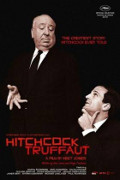
Directed by
Kent Jones
79 minutes
Rated PG
Reviewed by
Chris Thompson

Hitchcock/Truffaut
Synopsis: In 1962 French New Wave director Francois Truffaut convinced one of his cinema idols, Alfred Hitchcock, to spend a week sequestered in a room with him at Universal Studios in Hollywood where they would discuss how the ‘master of suspense’ viewed the process of filmmaking by working through each of his films.
Oh, to have been a fly on the wall during that week. At least, thanks to the foresight of Truffaut in engaging preeminent American portrait photographer, Phillipe Halsman, we have a stunning visual record to accompany the audio recordings of the two great directors as they (along with Helen Scott, their translator from the New York French Film Office) engaged in their wide ranging discussion. In some ways, though, as far as this doco is concerned, those interviews are a bit of a McGuffin (as Hitchcock would have said); they’re not exactly what the film is about. Rather, they are the trigger for a broader view of how the resulting book ‘Hitchcock by Truffaut’ and, more specifically, the works of Hitchcock continue to have an impact on an eclectic group of directors who, themselves, are pretty influential. The observations made by this terrific group are in turn interesting, astute, revealing and often entertaining. For the most part, though, they are less about shedding new light and more about affirming the stature afforded to Hitchcock in the Truffaut publication.
Whilst a wide range of clips from films extending across Hitchcock’s career are used to illustrate the talking heads to good effect, it’s Vertigo (1958) and Psycho (1960) that, as might be expected, get the most attention. It’s interesting to be reminded how much of a flop Vertigo was when it was first released and Scorsese’s commentary on how difficult it was in the ‘60s and ‘70s to find a decent print of the film points back to a time when access to movies was so much more limited than it is today.
The most interesting moments from the audio tapes are when Truffaut presses the director on the question of how Catholicism might have shaped his films at which point Hitch insists that he will answer but only after the tape is turned off. CLICK! It’s as fascinating a moment as it is frustrating. More forthcoming is Hitchcock’s attitude to criticisms about the plausibility of some of his plots. Despite admitting a rather large plot hole in Vertigo (you’ll have to see the doco to find out what it is) he dismisses the plausibility argument on the basis that logic doesn’t hold all that much interest for him.
Perhaps the most astute observation, though, is made by both Fincher and Scorsese regarding the visual richness of Hitchcock’s films being due to his start in silent movies where the image was everything. It’s where he learned the power of story told by pictures rather than words. Hitchcock says as much on tape, almost lamenting the need for dialogue in the talkie era. And when Truffaut describes a scene from his 1959 film The 400 Blows Hitchcock seems just a little disappointed that the scene in question is resolved with a line rather than an image.

Want more about this film?


Want something different?




